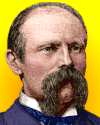 (source)
(source)
|
Sir Benjamin Baker
(31 Mar 1840 - 19 May 1907)
English civil engineer who was the chief designer of the railway bridge over the Firth of Forth.
|
Metal Fatigue
Remarks by Sir Benjamin Baker (reported in 1910)
[p.191] “Many engineers ignore the fact that a bar of iron may be broken in two ways—by a single application of a heavy stress, or by the repeated application of a comparatively light stress. An athlete's muscles have often been likened to a bar of iron, but if ‘fatigue’ be in question, the simile is very wide of the truth. Intermittent action, the alternative pull and thrust of the rower, or of the laborer turning a winch, is what the muscle likes and the bar abhors. A long time ago Braithwaite correctly attributed the failure of girders, carrying a large brewery vat, to the vessel being sometimes full and sometimes empty, the repeated deflection, although imperceptibly slow and free from vibration, deteriorating the metal, until in the course of years it broke. These girders were of cast iron, but it was equally well known that wrought iron was similarly affected, for Nasmyth afterward called attention to the fact that the alternate strain in axles rendered them weak and brittle, and suggested annealing as a remedy, having found that an axle which would snap with one blow when worn, would bear eighteen blows when new or just after annealing. We know that the toughest wire can [p.192] be broken if bent backward and forward at a sharp angle; perhaps only to locomotive and marine engineers does it appear that the same result will follow in time even when the bending is so slight as to be unseen by the eye. A locomotive crank-axle bends but 1/34 inch, and a straight driving axle but 1/64, under the heaviest bending stresses to which they are exposed, and yet their life is limited. Experience proves that a very moderate stress alternating from tension to compression, if repeated about a hundred million times, will cause fracture as surely as bending to a sharp angle repeated a few hundred times.”
- 31 Mar - short biography, births, deaths and events on date of Baker's birth.
- Benjamin Baker - Human Cantilever Demonstration of Forth Railway Bridge
- The Forth Bridge - by Benjamin Baker in Chambers’s Journal (1888),
- Booklist for the Forth Bridge.




